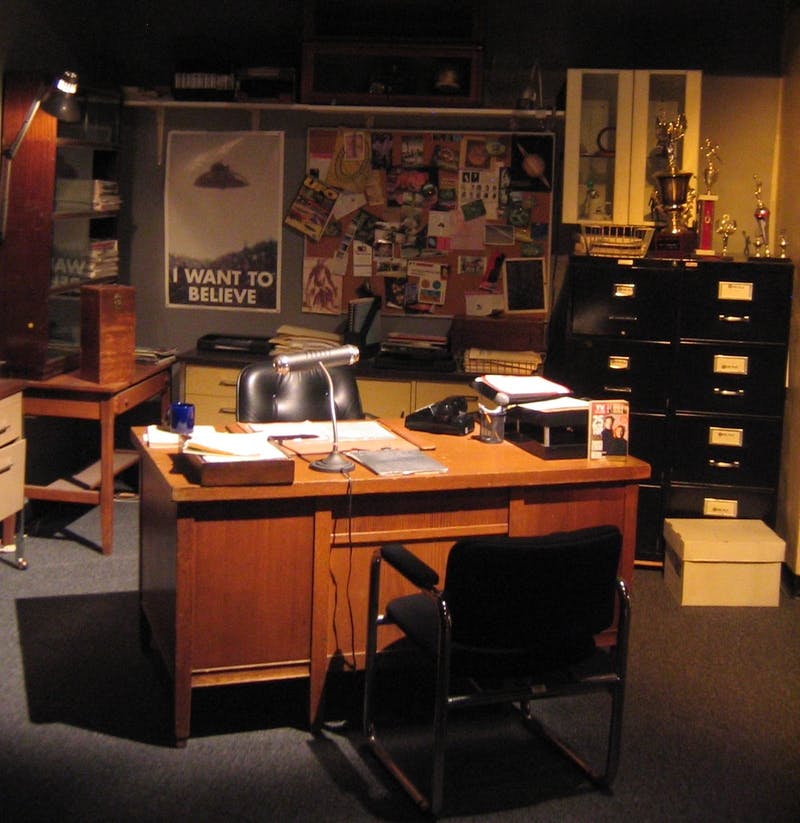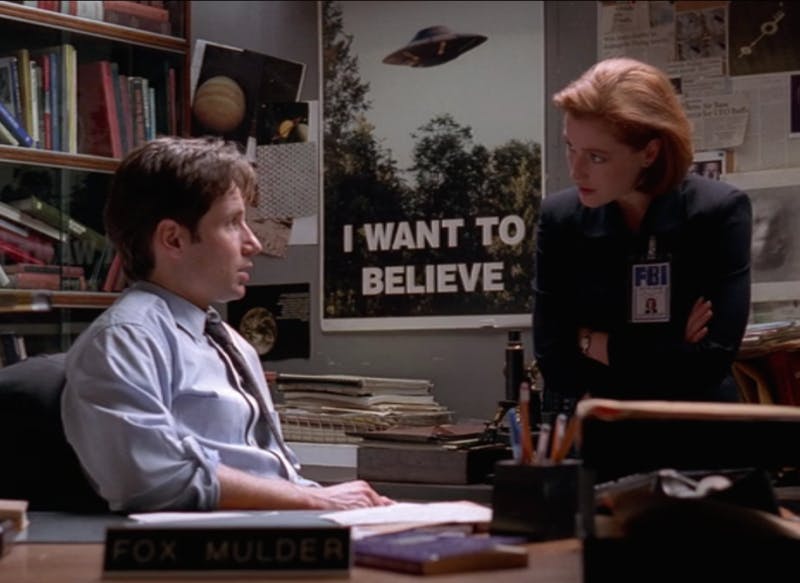On January 24, The X-Files returns to television in the form of a six-part miniseries. As the premiere date nears, original fans of the show—those who discussed it on the alt.tv.x-files newsgroup in the ‘90s, because social media did not yet exist and the internet was barely a thing—have been showing their enthusiasm in snake person ways, posting tens of thousands of tweets and Instagram posts labelled with an #iwanttobelieve hashtag.
“I want to believe,” a core sentiment of the show and its viewers, is a phrase that comes from an iconic item on the show: the UFO poster that hangs above the desk of FBI Special Agent Fox Mulder, everyone’s favorite socially isolated, orally fixated, paranoid insomniac alien chaser. When The X-Files became a hit in the mid-’90s, this poster was found on the bedroom wall of every self-respecting X-Phile. It was a special link to the show and Mulder’s hopeful yet tortured conviction that the truth was out there, shrouded in conspiracy, waiting to be uncovered.
Within the world of the show, the origin story of the “I Want to Believe” poster is that Mulder bought it from a head shop on M Street in Washington, D.C. The poster is ever present in the pitiful basement office to which the supernaturally focused X-Files are assigned. It makes its first appearance in the pilot, and lasts the whole nine seasons. The poster also appears in the 1998 X-Files movie, Fight the Future, as well as the horrendous abomination that was the 2008 movie, cruelly also titled I Want to Believe. I want to believe that this movie was never made. But there’s no need to talk about that.
Seven years ago, while doing publicity for the movie we won’t talk about, X-Files creator Chris Carter told Smithsonian.com that the look of the poster “came from me saying, ‘Let’s get a picture of a spaceship and put–Ed Ruscha-like—“I want to believe.”’” A bonus bit of insider info for copyright infringement nerds: Carter also said that no one got clearance for the UFO photo, which had been taken in Europe by a man named Billy Meier. Years after the show’s debut, this oversight caught up with him in the form of an intellectual property lawsuit. In response, a new poster appeared in the show in its fourth season, with a slightly different photo of a flatter UFO.

Mulder’s main quest—his all-consuming obsession—is to find out what happened to his sister Samantha, who was, as he recalls, abducted from the family home by aliens when he was 12 and Samantha was eight. Over the course of the show, Mulder and his FBI partner/soulmate/medical doctor/mother-of-his-child-but-that’s-a-whole-complicated-story Dana Scully uncover bits and pieces of evidence that point toward a grand conspiracy: that the U.S. government has been collaborating with extraterrestrials in an alien-human hybrid program. Among other things.
The X-Files portrays a world full of chaos, unsolved mysteries, and phenomena that don’t align with rational perceptions of the universe. People shape-shift into other human beings, turn into monsters, use telekinesis to harm others, and—in the case of the Cigarette-Smoking Man—cheat certain death multiple times. Terminal brain cancer, possibly of extraterrestrial origin, is diagnosed, then vanishes without a trace. Nothing makes sense. Answers are rare.
Faced with this uncertainty, Mulder wants to believe in everything. Aliens, the conspiracy, human-sized parasitic worms: all of it. He yearns for something greater and more meaningful than what’s immediately around him. He wants to believe there is a clear and supernatural explanation for Samantha’s disappearance, an event that gets reframed and distorted and muddled by conflicting discoveries and increasingly unreliable memories as every year passes.
Scully, the rationally-minded skeptic, does not want to believe in anything outside the realm of science—except God. This highly selective approach to belief is one of the more intriguing parts of the show, and adds a layer of “huh” to the mystery-wrapped enigma that is Dana Scully. It also invites questions about the role of religion, the role of science, and whether the two ought to be regarded as opposing forces or parts of a whole.

The phrase “I want to believe” is different than “I believe.” It is hopeful, but indicates an awareness of doubt and disappointment and fallibility. And it taps into the deepest human fear: what if this is all there is? Without aliens and without God, we’re just us: a bunch of intelligent yet stupid humans crammed onto a spherical rock in an inconsequential speck of infinite space. That can’t be it. We must be special. We must be important. “I want to believe so badly in a truth beyond our own,” says Mulder in a seventh season episode called “Closure.” What’s in front of us is not enough.
In the classic season three episode “Jose Chung’s From Outer Space,” a D&D-playing loner named Blaine Faulkner talks about how much he wants to be abducted by aliens. To be chosen. To be special. But his yearning is a little less profound than Mulder’s. “I hate this town,” he says. “I hate people. I just want to be taken away to someplace where I... I don’t have to worry about finding a job.”
Regardless of the nature of the motivation, wanting to believe, and having the fervor of that desire burn within you, inevitably invites disappointment. In Mulder’s case, it is the repeated agony of being tricked and mislead by the forces that conspire against him—particularly when he is repeatedly introduced to cloned versions of his sister, all of whom are mere facsimiles of the person he has spent his life searching for. For X-Philes, it was the second X-Files movie. Jesus Christ. That thing was terrible. Anyway. We don’t need to talk about it.
The mini-series is almost here, and, judging from the previews, it looks like it’s going to be amazing. And the iconic poster is back on screen–the trailer for the new episodes shows someone entering the empty, gutted X-Files office, finding the poster lying on the ground and kicking it, tearing it in two.
When the trailer featuring the poster kick appeared, some OG X-Files fans had a bit of a freakout on Twitter. The “I Want to Believe” poster may be available everywhere online for $7.99 and up, but it still means a lot. It sums up our hopes and fears. We all want to believe that our faith will be justified, that our quest will meet a redemptive end, that our dedication will be rewarded—whether that reward be the full story of a sister’s disappearance, an eternity in Heaven or a six-episode mini-revival of our favorite ‘90s sci-fi show.
*

This article is a part of No One’s Watching Week, the time of the year when the readers are away, and your tireless editors have run amok. For this week only, Atlas Obscura, New Republic, Popular Mechanics, Pacific Standard, The Paris Review, and Mental Floss will be swapping content that may be too out there for any other week in 2015. This article originally appeared on Atlas Obscura.
